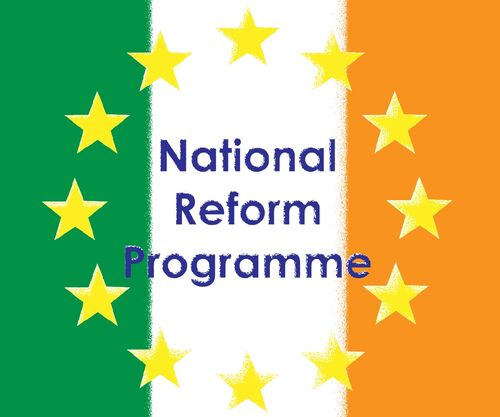In mid-February the Irish National Organisation of the Unemployed (INOU) made a submission to the development of Ireland’s National Reform Programme 2023 , and this article will cover some of its content. The Department of An Taoiseach are the lead Department for this part of the European Semester process, which is the annual economic and fiscal co-ordination at the EU level.
Employment Target
Ireland’s contribution to the European Pillar of Social Rights Action Plan 2030 Headline Employment Rate Targetis “a target of 78.2%, from a 2020 baseline of 73.4%. This is 3.1% higher than our highest ever employment rate of 75.1% in 2019.” According to the Labour Force Survey for Quarter 4, 2022, published by the Central Statistics Office on February 23 rd , the employment rate for people aged 15-64 years was 73.2%. When young people aged 15-19 years are taken out of this figure, the employment rate is 78.3%, 0.1 percentage point higher than Ireland’s 2030 Headline Employment Rate Target.
In the Country Report 2022 on Ireland, the European Commission notes “ The comparatively low levels of employment for some groups may point to untapped labour market potential and contribute to risks of poverty and social exclusion. In 2021, the employment rates of low- and medium-skilled workers aged 20 to 65 were 51.3% and 69.5% respectively, compared to an overall employment rate of 74.9%. In 2020, the employment rate of lone parents stood at 64% – the lowest in the EU. In addition, the disability employment gap in Ireland was the largest in the EU, at 38.6%. These groups are also at an elevated risk of poverty and social exclusion. Tackling these challenges in line with the European Pillar of Social Rights is key for Ireland to contribute to reaching the 2030 EU headline targets on employment, skills and poverty reduction.” (p15)
It is clear that to address the challenges that face particular groups in the labour market, sub-targets must be set and exclusion in the labour market must be properly addressed by Ireland.
Recovery and Resilience Plan (RRP)
Ireland’s RRP has a limited number of actions developed at a time when everyone was unsure how the labour market would recover from the impact of the Covid-19 pandemic measures. In Quarter 4 2022, Ireland had over 2.57m people in employment, an historic high. 112,000 people were unemployed: 1,500 more people than in the same quarter in 2019, though the unemployment rate, at 4.2%, was 0.3 percentage points lower.
Two of the action under Priority 3 of the Recovery and Resilience Plan entitled Social and Economic Recovery and Job Creation, focus on:
- 3.1 - Work Placement Experience Programme – EU funds will be used in support of our ambitious new Work Placement Experience Programme, targeted at reaching 10,000 participants;
- 3.2 - Solas Recovery Skills Response Programme will see a range of additional educational and training programmes rolled out as part of the Skills to Compete and the establishment of the SOLAS Green Skills Action programme focusing on providing training to address climate and low carbon economy issues;
In January 2023, there were 539 participants on the Work Placement Experience Programme, making it the third smallest of the Activation Programme reported on in the Annex to the Live Register release in February. While in their Annual Report 2021, SOLAS noted on Skills to Compete initiative that “To date this has helped 16,700 people make the journey back towards employment.” (p5)
Poverty Target
Ireland’s contribution to the European Pillar of Social Rights Action Plan 2030 Headline Poverty Reduction Target is “ that at least two-thirds of the Irish contribution (that is, 60,000 of the 90,000) should be children. This is more ambitious than the proposal by the European Commission and recognises the more ambitious At Risk of Poverty or Social Exclusion target set out for children in the Roadmap for Social Inclusion.”
Striving for a more ambitious approach is to be welcomed, seeking to ensure that children living in poverty are not prevented from living their lives to their full potential must be a clear and strong focus of a wide range of Government policy and its implementation. However, it is equally important that every effort is made to ensure that people who experience poverty because of, for example, their ethnicity, socio-economic status, duration of unemployment, disability, family circumstances are also included in the work to meet these targets.
Adult Learning Participation Target
According to the European Pillar of Social Rights Action Plan the adult learning participation target is that “At least 60% of all adults should participate in training every year” and on page eleven they note that “ In the context of recovery and of the twin transitions, increasing adult participation in training to 60% is paramount to improve employability, boost innovation, ensure social fairness and close the digital skills gap.” Ireland's adult learning participation target is 64.2%.
The Covid-19 pandemic highlighted the digital divide in Ireland and its implications for securing and maintaining decent employment. Priority 2 of Ireland’s Recovery and Resilience Plan is entitled: Accelerating and Expanding Digital Reforms and Transformation . Action 2.7 aims to “Address the Digital Divide and Enhance Digital Skills, by developing a new 10 Year Adult Literacy, Numeracy and Digital Literacy Strategy and a new Digital Strategy for Schools.” It is absolutely critical that Ireland gets this right, otherwise the socio-economic gap evident during the Covid-19 pandemic will widen and will become increasingly difficult to bridge. This is not only a challenge for the development of an inclusive labour market, but to ensure that people feel they can access public services as comfortably as possible. Many people welcome the increased digitalisation of Ireland’s public services, but for other people it heightens their sense of exclusion for vital supports and services, ones they felt they could more readily avail of previously.
The full submission is ( linked here ).
